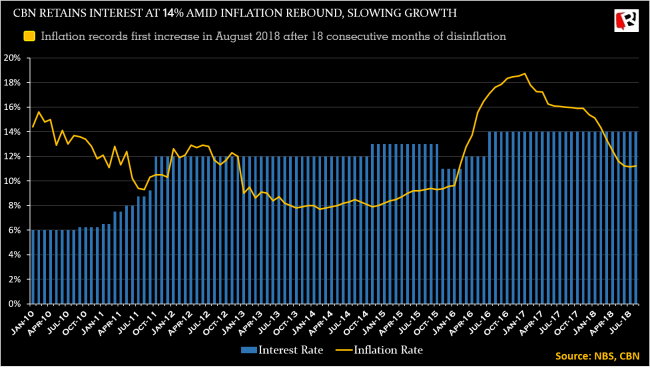Business
Amid inflation reversal, slowing growth, CBN’s MPC retains interest rate at 14%

In spite of the reversal in downward inflationary trend and slowing economic growth in the country, the Monetary Policy Committee (MPC) of the Central Bank of Nigeria (CBN) has again retained its key lending rate for the 12th consecutive time.
CBN Governor, Godwin Emefiele, announced the decision of the committee at the end of a two-day meeting on Tuesday in Abuja.
According to Emefiele, seven out of the ten members of the committee that attended the meeting agreed to maintain the monetary policy stance, adding that three of the members voted to increase the Cash Reserve Ratio (CRR) by 150 basis points, while the other three members voted to raise the interest rate.
He said the committee also left the Asymmetric Corridor unchanged at +200 and -500 basis points around the interest rate; Cash Reserve Ratio at 22.5 percent; and Liquidity Ratio at 30 percent.
The MPC had in July 2016 raised the interest rate, which determines the rate at which banks give out loans, by 200 basis points to a record high of 14 percent in July, 2016, to curtail rising inflationary trend and salvage Nigeria’s recessed economy.
The apex bank’s refusal to soft-pedal in its monetary policy stance in a bid to curtail inflationary pressures has continued to negatively impact on the nation’s external reserves and economic growth as there was no enough funds available to the real sector.
Nigeria’s foreign exchange reserves, which stood at $47.79 billion as at July 5, dropped to $44.83 billion as at September 21, the lowest level in more than six months.
The persistent drop in Nigeria’s foreign reserves of about 6.22 percent, reaching $2.97 billion in less than three months, may not be unconnected to CBN’s sustained weekly interventions in the foreign exchange market to meet the United States (US) dollars demands by exiting investors, and the recent hike in the US Federal Reserves.
Read also: SOWORE: If senators’ N13.5m hasn’t caused inflation, why will N100,000 to a worker do so?
According to the National Bureau of Statistics (NBS), the nation’s Gross Domestic Product (GDP) contracted in the second quarter of 2018 to 1.50 percent year-on-year (YoY) from 1.95 percent YoY recorded in the preceding quarter.
Growth in the manufacturing sector and Agriculture sectors, which form the real sector, slowed in the quarter to 1.19 percent and 0.68 percent from 3.00 percent and 3.39 percent, respectively.
Likewise, the nation’s inflation rate, which is the rate at which the prices of goods and service are rising in the country, rose for the first time in August after recording eighteen (18) consecutive months of disinflation from 11.14 percent in July to 11.23 percent.
To mitigate the sluggish growth occasioned by paucity of funds to the real sector of nation’s economy, the CBN in its July meeting had adopted an alternate approach to make funds available to companies in the sector.
According to Emefiele, the apex bank would encourage large corporate organizations in the country to issue Commercial Papers (CPs) at single-digit interest rates to boost their operating capital.
Commercial papers are money-market securities sold by large corporations to obtain funds to meet short-term debt obligations, and are backed only by an issuing bank.
By Oluwasegun Olakoyenikan….
RipplesNigeria… without borders, without fears
Click here to join the Ripples Nigeria WhatsApp group for latest updates.
Join the conversation
Support Ripples Nigeria, hold up solutions journalism
Balanced, fearless journalism driven by data comes at huge financial costs.
As a media platform, we hold leadership accountable and will not trade the right to press freedom and free speech for a piece of cake.
If you like what we do, and are ready to uphold solutions journalism, kindly donate to the Ripples Nigeria cause.
Your support would help to ensure that citizens and institutions continue to have free access to credible and reliable information for societal development.























